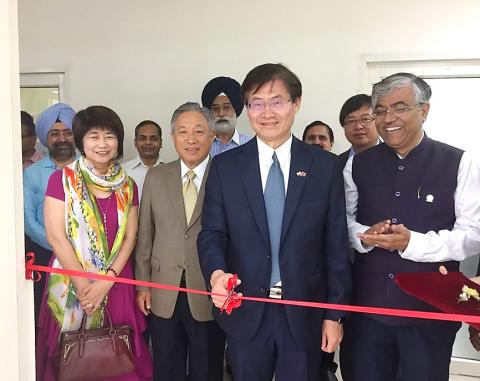Deputy Minister of Science and Technology Hsu Yu-chin (許有進) on Saturday inaugurated the Indo-Taiwan Joint Research Center on Artificial Intelligence (AI) and Machine Learning at the Indian Institute of Technology Ropar (IIT Ropar) in Rupnagar.
Hsu’s seven-day visit to India ends tomorrow.
On Thursday last week, he attended a conference on technological collaboration between Taiwan and India in New Delhi with Representative to India James Tien (田中光) and Indian Department of Science and Technology Secretary Ashutosh Sharma.

Photo courtesy of the Taipei Economic and Cultural Center in India via CNA
Since Taiwan and India in 2007 signed a memorandum of understanding (MOU) to promote technological cooperation, the two sides have co-funded 86 research programs and published more than 180 research papers with the Science Citation Index, the Ministry of Science and Technology said.
Taiwan and India mainly collaborate in areas related to AI, renewable energy, the Internet of Things, big data, information security, microelectronics, nanoelectronics, biotechnology, healthcare, drug development, agriculture and food, the ministry said.
After Thursday’s conference, the two sides also agreed to promote 10 new joint projects, the ministry said, without elaborating.
The AI center at IIT Ropar was established by IIT Ropar, India’s Chitkara University and Taiwan’s National Chung Cheng University (NCCU).
The ministry said it subsidized NCCU to form an academic alliance with the two Indian institutions.
India has attracted many Taiwanese investors with its advanced information and communications technology and software industries, in line with the government’s New Southbound Policy, NCCU Research and Development dean Jack Huang (黃士銘) said at the center’s inauguration.
The number of Indian students at NCCU has grown from 21 in the 2017 academic year to an estimated 75 in this year’s fall semester, he said, adding that India’s population of more than 1.3 billion people is a potential talent pool for Taiwan.
Huang said he hopes the AI research center’s setup would convince more excellent Indian students to study in Taiwan.
With Hsu as a witness, the ministry and the Indian Council of Social Science Research on Friday signed their first MOU promoting bilateral collaboration in humanities and social sciences, it said.

Alain Robert, known as the "French Spider-Man," praised Alex Honnold as exceptionally well-prepared after the US climber completed a free solo ascent of Taipei 101 yesterday. Robert said Honnold's ascent of the 508m-tall skyscraper in just more than one-and-a-half hours without using safety ropes or equipment was a remarkable achievement. "This is my life," he said in an interview conducted in French, adding that he liked the feeling of being "on the edge of danger." The 63-year-old Frenchman climbed Taipei 101 using ropes in December 2004, taking about four hours to reach the top. On a one-to-10 scale of difficulty, Robert said Taipei 101

Nipah virus infection is to be officially listed as a category 5 notifiable infectious disease in Taiwan in March, while clinical treatment guidelines are being formulated, the Centers for Disease Control (CDC) said yesterday. With Nipah infections being reported in other countries and considering its relatively high fatality rate, the centers on Jan. 16 announced that it would be listed as a notifiable infectious disease to bolster the nation’s systematic early warning system and increase public awareness, the CDC said. Bangladesh reported four fatal cases last year in separate districts, with three linked to raw date palm sap consumption, CDC Epidemic Intelligence

US climber Alex Honnold left Taiwan this morning a day after completing a free-solo ascent of Taipei 101, a feat that drew cheers from onlookers and gained widespread international attention. Honnold yesterday scaled the 101-story skyscraper without a rope or safety harness. The climb — the highest urban free-solo ascent ever attempted — took just more than 90 minutes and was streamed live on Netflix. It was covered by major international news outlets including CNN, the New York Times, the Guardian and the Wall Street Journal. As Honnold prepared to leave Taiwan today, he attracted a crowd when he and his wife, Sanni,

Taiwanese and US defense groups are collaborating to introduce deployable, semi-autonomous manufacturing systems for drones and components in a boost to the nation’s supply chain resilience. Taiwan’s G-Tech Optroelectronics Corp subsidiary GTOC and the US’ Aerkomm Inc on Friday announced an agreement with fellow US-based Firestorm Lab to adopt the latter’s xCell, a technology featuring 3D printers fitted in 6.1m container units. The systems enable aerial platforms and parts to be produced in high volumes from dispersed nodes capable of rapid redeployment, to minimize the risk of enemy strikes and to meet field requirements, they said. Firestorm chief technology officer Ian Muceus said